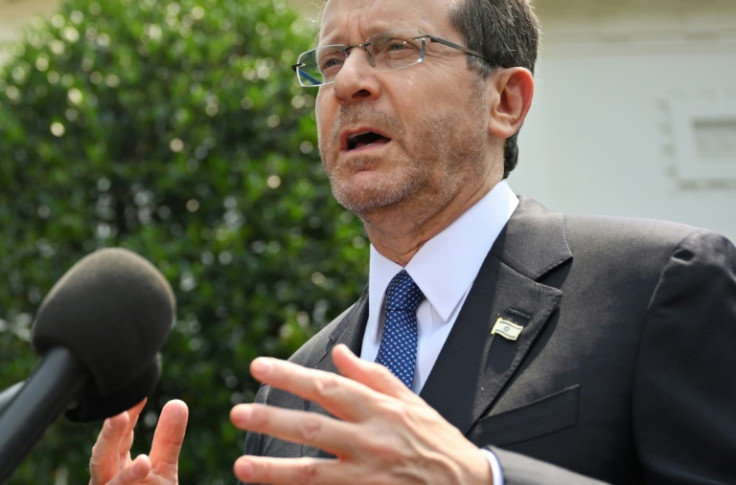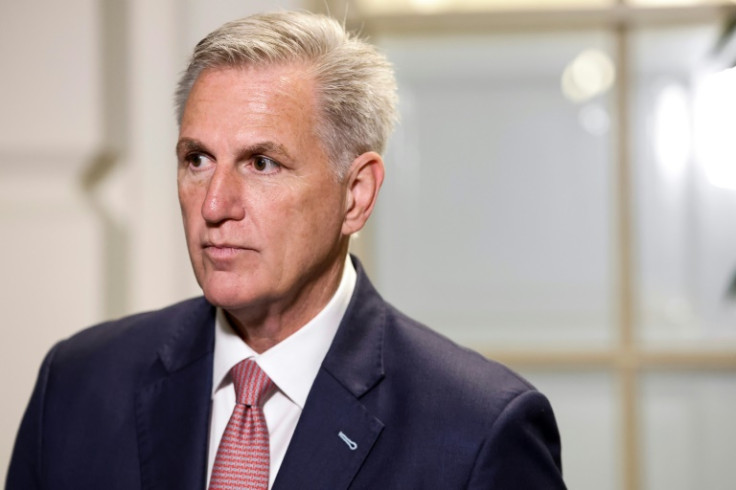Herzog To Address US Lawmakers Amid Anti-Israel Tensions

The US Congress prepared to welcome President Isaac Herzog Wednesday for a speech celebrating 75 years of Israeli independence, as a row over anti-Semitism highlighted fissures in Democratic Party support for the Middle Eastern ally.
Herzog holds a largely ceremonial role and is far less controversial than the country's Prime Minister Benjamin Netanyahu, but President Joe Biden's party has nevertheless been convulsed by infighting over the visit.
A handful of congressional Democrats are longstanding critics of the conservative-leaning Israeli government, accusing it of disenfranchising Palestinians, and have vowed to skip the joint meeting of the Senate and House.
Republican House Speaker Kevin McCarthy brought a measure to the floor Tuesday condemning anti-Semitism and affirming support for Israel in a rebuke of leading Democrat Pramila Jayapal, who sparked an angry backlash from her own party by calling Israel a "racist state."
She retracted under intense pressure from Democratic colleagues and apologized, saying she did not believe "the idea of Israel as a nation is racist," but Republicans still called for her removal as chair of the leftist Progressive Caucus.
Forty-three House Democrats reacted to Jayapal's remarks with a statement saying they would "never allow anti-Zionist voices that embolden anti-Semitism to undermine and disrupt the strongly bipartisan consensus supporting the US-Israel relationship that has existed for decades."
Gregory Meeks, the top Democrat on the Foreign Affairs Committee, called Herzog a "rare symbol of unity in a polarized society" in a speech on the House floor.
"Without question, the Democratic Party, my Democratic Party, supports the long-term viability of the Jewish state and knows its true character and importance," he said.
Republicans were themselves forced onto the back foot on the issue of anti-Semitism on Tuesday as Democrats urged McCarthy in a letter to withdraw an invitation to Robert F. Kennedy Jr. to testify before Congress.
The longshot Democratic presidential candidate is due to appear on Wednesday before a House panel investigating alleged government censorship of conservatives.
But he sparked a firestorm of controversy at the weekend with comments suggesting that Covid-19 had been "ethnically targeted" to spare Jews and Asians.
The group of House Democrats said allowing Kennedy to testify only served to "legitimize his antisemitic and anti-Asian views" -- even likening him to Adolf Hitler.
Members of the Kennedy family rushed to condemn the candidate -- an anti-vaccine conspiracy theorist who is more popular among conservatives than Democrats -- and the White House called his remarks "vile."
McCarthy -- who visited Israel in May and was the first speaker to address the country's parliament, the Knesset, since Georgia Republican Newt Gingrich in 1998 -- said he disagreed with Kennedy's comments but rejected the request.
"I don't think censoring somebody is actually the answer here," he said.
The high-profile Herzog visit is seen as a chance for Washington to underline its backing for one of the United States' closest and most consequential alliances.
Biden hosted his counterpart in the Oval Office on Tuesday, where the pair discussed Netanyahu's divisive push to reform the court system and expand Jewish settlements in occupied Palestinian territories.
In a phone call Monday, Biden invited Netanyahu to meet in the United States for the first time since the prime minister returned to power.
After his appearance before Congress, Herzog is due to address the bipartisan Abraham Accords Caucus, which was set up last year to celebrate steps toward normalization in Israeli relations with the Arab states.

© Copyright AFP 2025. All rights reserved.





















